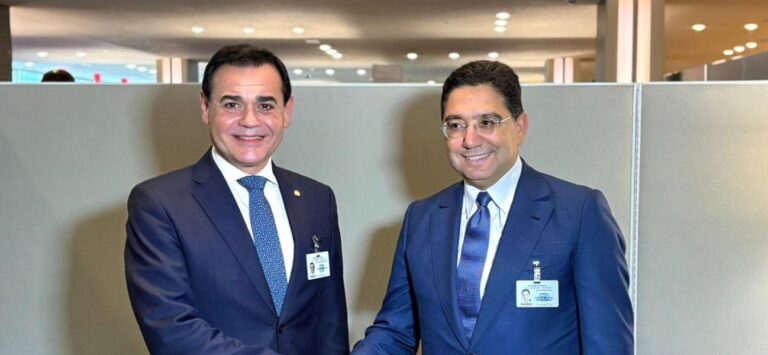Marrakech – Paraguay has officially recognized Morocco’s sovereignty over its Western Sahara territories and is planning to open a consulate in the southern provinces, announced Paraguayan Foreign Minister Rubén Darío Ramírez Lezcano on Monday in New York.
“We support Morocco’s sovereignty over its Sahara, and we are planning to open a Paraguayan consulate in this region soon,” Lezcano told the press after meeting with Moroccan Foreign Minister Nasser Bourita.
He also voiced support for Morocco’s 2007 initiative to negotiate a Statute of Autonomy for the region. The announcement came on the sidelines of the 80th session of the UN General Assembly.
This decision, he stressed, was taken “in accordance with the principles of international law and the United Nations Charter, and in support of the efforts of the UN Secretary-General to reach a solution to this long-standing dispute.”
The Paraguayan diplomat also revealed that President Santiago Peña Palacios will visit Morocco soon, and that he himself plans to make a trip before the end of the year.
This significant diplomatic advancement caps years of steadfast support from Paraguay’s legislature, representing a decisive political alignment on the Sahara dispute.
In December 2024, Paraguay’s Lower House passed a resolution forcefully reiterating its “unwavering support for Morocco’s sovereignty over its Southern Provinces.”
The Chamber endorsed Morocco’s autonomy initiative as the foundation for resolving the regional dispute in compliance with international law.
The Senate had taken similar action a month earlier, on November 13, 2024, supporting “the autonomy initiative proposed by Morocco as a basis for achieving a peaceful, fair, lasting, and mutually acceptable solution.”
Both chambers urged their government to officially adopt this position and provide explicit support in international forums.
Since Morocco established its embassy in Asunción in November 2016, the Paraguayan Chamber of Deputies has adopted seven resolutions, with five explicitly supporting Morocco’s territorial integrity and sovereignty over the Sahara.
Latin America has been quietly shedding its Cold War reflexes and 1970s-style “liberation” stance toward Western Sahara. Peru suspended relations with the self-proclaimed “SADR” in September 2023, while Ecuador froze recognition in October 2024.
Chile’s Senate has publicly backed Morocco’s Autonomy Plan, and Brazil – South America’s heavyweight – has never recognized the SADR, despite some lawmakers once pushing for it.
The shift is driven less by ideology, more by pragmatism. Governments are prioritizing trade, energy, and Atlantic partnerships – and reading the global wind as major powers now openly describe Morocco’s plan as the most serious, credible, and viable path.
This narrows the space for outdated 1970s templates in Latin American foreign policy. The result is a de facto regional consensus: with a few holdouts or ambiguities, most capitals have either suspended SADR recognition or tilted toward Morocco’s autonomy proposal as the workable endgame.
Asunción’s announcement also coincides with Bourita’s meeting in New York with Staffan De Mistura, the UN Secretary-General’s Personal Envoy for the Moroccan Sahara.
During this working session, the Moroccan delegation reaffirmed the country’s position, defined by King Mohammed VI, to reach a political solution based exclusively on Morocco’s autonomy initiative, within the framework of the country’s sovereignty and territorial integrity.
Over 100 countries now support Morocco’s autonomy initiative as a credible political solution to end the dispute, including more than 20 EU countries.


